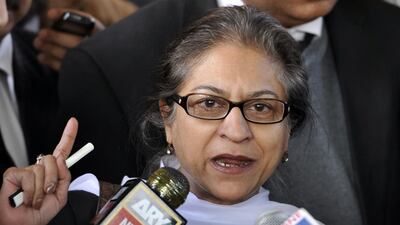The death of human rights activist and lawyer Asma Jahangir on Sunday has deprived Pakistani society of its most effective voice against the abuses and bigotry of its competing power centres.
Jahangir, who was 66 when she died, battled political and social oppression in Pakistan with outstanding courage, eloquence and integrity for more than 40 years.
During military dictatorships, when most lawyers lacked the courage or conviction to do so, she provided outstanding advocacy to innumerable women, children, bonded labourers, political prisoners and members of religious minorities.
Amid Pakistan’s fitful flirtations with democracy, she browbeat politicians into enacting reforms which have benefited society as a whole.
Throughout her career, she offered Pakistanis a commonsense narrative grounded in shared humanity and the proverbial common good as a desirable alternative to the Machiavellian monologues propagated by the state and its minions.
Her personal and professional qualities earned her many plaudits.
At home, she was elected the leader of the most influential lawyers’ organisation, the Supreme Court Bar Association of Pakistan. She was honoured on the global stage as a UN special rapporteur on freedom of belief.
These achievements forced Jahangir’s powerful detractors to grudgingly acknowledge her effectiveness and professionalism. Indeed, their tributes are prominent among the chorus of condolences evoked by her sudden death following a heart attack.
Upon the loss of such a national icon, it is all very befitting.
But equally, it is representative of the mindset Jahangir spent her life fighting.
The powerful individuals and institutions seeking to honour her in death had spent decades slandering her for being unabashedly secular. She often said "humanity" was her only belief system.
These atheistic declarations were seized upon by Jahangir’s detractors as evidence of her participation in a multitude of supposed "conspiracies against Islam and Pakistan".
Therein lies the irony.
Jahangir was demonised by dictatorial detractors for exercising what scholars of the Abrahamic religions describe as the divine right of choice in matters of faith.
Likewise, Pakistan’s founder, Mohammed Ali Jinnah, declared that a person’s religious beliefs had “nothing to do with the business of the state”.
But anyone who was to defend Jahangir's belief system would be victimised for challenging the state’s reinvention of religious and national identity as one and the same. In doing so, they would run a very real risk of being declared a blasphemous traitor and live in fear of enforced disappearance or mob lynching.
Jahangir was vocal and much more of a Pakistani patriot for being so. She has died at a time of great turmoil within Pakistan.
Its rival power centres – primarily the military, politicians and judiciary – are deeply embroiled in a fight over who rules the country and to what extent. Now at its peak, this pitched battle is remarkable for its blind hatred and utter intolerance.
Packaged and broadcast 24/7 by a plethora of Fox-inspired cable news channels, it has poisoned Pakistani society. Internal divisions are at it their deepest since 1971, when a similar state of affairs caused the country to break apart into current-day Pakistan and Bangladesh.
Meanwhile, Pakistan’s competing power centres are complicit in glossing over the diplomatic crisis currently faced by the country.
Pakistan’s relationship with the US is at breaking point because of their undeclared rivalry over Afghanistan. Despite declarations to the contrary by both sides, the war there may soon result in unilateral US military action against militants on Pakistani soil, beyond the recent uptick in unsanctioned drone strikes.
But Pakistanis have been told relations are on the mend. When the drones have struck without Pakistan’s authorisation, they are told the incident happened in an adjoining area of Afghanistan. And so on and so forth.
Jahangir argued, righteously, that a state is only as strong as its society. The stability and solidarity of a country is most threatened when state ideology and military power supercedes the rights of its citizens for too long. Deprivation breeds resentment which, in turn, transforms cultural and religious identity into a platform for rivalry. It is a mere matter of time before these rivalries are manipulated to beget chaos.
The disintegration of the Soviet Union, in the aftermath of its ill-conceived occupation of Afghanistan, is the obvious example. From a Pakistani perspective, it is also the most appropriate one to cite.
Befittingly, Jahangir’s last public engagement was to speak at a sit-in protest staged in Islamabad by ethnic Pashtuns from the federally administered northwest tribal areas, until 2015 the stronghold of Pakistani Taliban insurgents and their Al Qaeda allies.
Since the 9/11 terrorist attacks, the resident tribespeople have been wedged between the militants, the Pakistani military and US drones. They have suffered terribly but accepted their situation as a necessary sacrifice in the national interest.
Rather than being recognised for their heroism, however, they have been treated as militant collaborators and subjected to ethnic profiling. Many have disappeared and fallen victim to extrajudicial executions.
The recent protest in Islamabad was triggered by one such atrocity recently in Karachi. The state tried to conceal the sit-in by unofficially imposing a ban on television coverage. However, the stoicism and good behaviour of the protesters prevailed and they dispersed on the day of Jahangir’s death, having gained concessions and assurances from the various arms of the state.
She would have been pleased. She would also have been sceptical about the state’s intentions regarding the fulfilment of its promises. That will only happen when Pakistanis see through the false narratives perpetrated by those competing to rule them without accountability and shame them into acting in the public interest.
Tom Hussain is a journalist and political analyst in Islamabad

